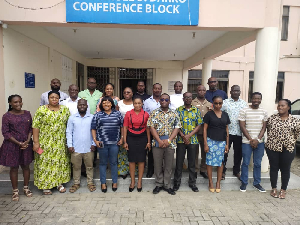 The workshop aimed to sharpen the preparedness of stakeholders
The workshop aimed to sharpen the preparedness of stakeholders
The National Disaster Management Organization (NADMO), with support from the United Nations Development Programme (UNDP's) Insurance and Risk Finance Facility (IRFF), has conducted a simulation exercise for selected MMDCEs on deployment at Emergency Operation Centres (EOC), a central command structure for disaster response management.
This initiative serves as a test for validating a contingency plan developed for the Greater Accra Metropolitan Area (GAMA) as part of a Sub-Sovereign parametric flood risk insurance product being developed in GAMA for selected MMDCEs.
The participants included planning officers from the Assemblies, NADMO officers, the National Ambulance Service, the Ghana Health Service, the National Insurance Commission, Civil Society Organizations, the Ghana Meteorological Agency, and the Ghana National Fire Service.
Mr. Frank Aggrey, the main facilitator of the program, took the participants through a series of literature and steps needed to run a successful simulation exercise.
The workshop aimed to sharpen the preparedness of stakeholders from the Klottey Korle Municipal Assembly and the Accra Metropolitan Assembly in the Greater Accra Region.
Dr. Eric Twum, a consultant, also took the participants through some relevant components and response structures highlighted in the contingency plan document.
Speaking during the simulation workshop in the Central Region, Mr. Richard Amo Yartey, Director of Inspectorate at NADMO, highlighted the importance of EOCs despite Ghana's relatively low disaster levels.
The EOC structure includes the Director-General, the head of response, DDCOPs, the director of operations, relevant agencies, the communication unit, regional EOCs, and district EOCs.
At the district level, the Chief Executive Officer chairs the committee, with the NADMO officer serving as the Secretary and advising on disaster risk management.
He warned that NADMO officers are not rapporteurs on the committee.
Mr. Yartey explained that EOCs are essential at national, regional, district, and community levels.
These committees, he said, are expected to meet every three months to assess their preparedness for emergencies.
Currently, NADMO operates ten EOCs in the ten old regions with eleven pilot centers across the country.
Mr. Yartey emphasized that Section 2 of the NADMO Act mandates the development of community capacities to respond effectively to disasters, while Section 3 enjoins NADMO to organize simulation exercises for disaster preparedness.
The simulation exercises are designed to last between four to eight hours, aiming to be as realistic as possible.
These exercises help identify capacity and operational gaps, promote cooperation, enhance efficiency, and develop disaster management and contingency plans for various emergency types, he stressed.
Dr. Amina Sammo, the UNDP's IRFF Representative, during her remarks at the program, stated that "Today's exercise represents a significant step forward in our collective journeys towards resilience.
The Contingency plan developed is a key component of our strategy to mitigate the impacts of disasters.
By integrating insurance and risk finance mechanisms within our planning structure, we are ensuring that we have the necessary capacities, capabilities, tools, and resources to respond swiftly and effectively when disasters occur."
She further noted that by participating in this exercise, we are testing our plans, communication channels, and coordination mechanisms, we are identifying strengths and areas for improvement, which will enable us to enhance our overall disaster response capabilities.
This proactive approach is crucial in minimizing the impact of disasters and accelerating recovery efforts.
The Director of Strategy and Disaster Reduction, Madam Charlotte Norman, in her remarks, noted that the rationale behind the simulation exercises is to monitor hazards ahead of time, enabling NADMO and the relevant agencies to make strategic decisions when disasters occur.
In conclusion, she further thanked the UNDP's IRFF for their support that has enabled NADMO to organize this important exercise, and to all participants for their dedication and hard work. Together, we can make a significant impact in enhancing disaster preparedness and resilience in Greater Accra.